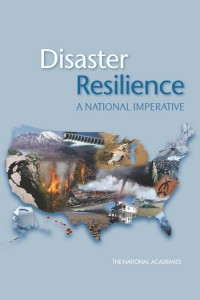No person or place is immune from disasters or disaster-related losses. Infectious disease outbreaks, acts of terrorism, social unrest, or financial disasters in addition to natural hazards can all lead to large-scale consequences for the nation and its communities. Communities and the nation thus face difficult fiscal, social, cultural, and environmental choices about the best ways to ensure basic security and quality of life against hazards, deliberate attacks, and disasters. Beyond the unquantifiable costs of injury and loss of life from disasters, statistics for 2011 alone indicate economic damages from natural disasters in the United States exceeded $55 billion, with 14 events costing more than a billion dollars in damages each.
One way to reduce the impacts of disasters on the nation and its communities is to invest in enhancing resilience–the ability to prepare and plan for, absorb, recover from and more successfully adapt to adverse events. Disaster Resilience: A National Imperative addresses the broad issue of increasing the nation’s resilience to disasters. This book defines “national resilience”, describes the state of knowledge about resilience to hazards and disasters, and frames the main issues related to increasing resilience in the United States. It also provide goals, baseline conditions, or performance metrics for national resilience and outlines additional information, data, gaps, and/or obstacles that need to be addressed to increase the nation’s resilience to disasters. Additionally, the book’s authoring committee makes recommendations about the necessary approaches to elevate national resilience to disasters in the United States.
Enhanced resilience allows better anticipation of disasters and better planning to reduce disaster losses-rather than waiting for an event to occur and paying for it afterward. Disaster Resilience confronts the topic of how to increase the nation’s resilience to disasters through a vision of the characteristics of a resilient nation in the year 2030. Increasing disaster resilience is an imperative that requires the collective will of the nation and its communities. Although disasters will continue to occur, actions that move the nation from reactive approaches to disasters to a proactive stance where communities actively engage in enhancing resilience will reduce many of the broad societal and economic burdens that disasters can cause.
The full report is available online.





